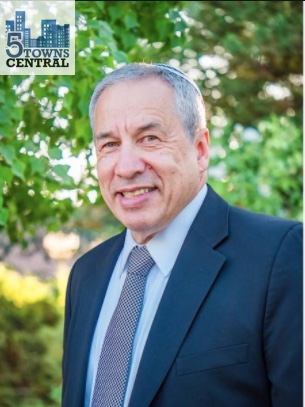[5TC Disclaimer: These are the sole views and opinions of the author. As always consult with your local Rav and or Physician.]
Please excuse the length of this letter, but I feel that I have many important things that must be said to you now.
As an Orthodox Jew and an ordained rabbi, I am fully aware that the Torah and CHAZAL/Rishonim/Achronim/Halacha mandate that we pray every day. Ideally, praying with a quorum of ten men, at a minyan in a synagogue is the better way to do the “service of the heart”. From my perspective the Halacha is unequivocal and we are duty-bound to accept it in both theory and practice.
The inability to pray with a minyan has been a painful consequence of this pandemic for many Orthodox Jews. And the desire to have a minyan three times daily, in any venue, is a genuine yearning of the soul for Orthodox Jews.
In the best of all possible worlds, in the worst of all possible circumstances, a deceased Jew deserves a eulogy in front of his family, friends, and fellow community members. The deceased deserves a quorum at the cemetery to do the burial and to enable sons, daughters (if they choose), or in the absence of children, someone else, to say Kaddish at the grave.
The mourners merit a week of Shiva with a minyan in their home and the opportunity to say Kaddish. The mourners and those outside the immediate family deserve the opportunity to share in the grief and to offer consolation by means of a personal visit. And the mourners deserve an available minyan to say Kaddish daily after the Shiva.
The pandemic has denied everyone these opportunities. The deceased has suffered the worst fate. The families of the deceased have suffered terribly over the loss itself and by being deprived of a normal Shiva week. Consolation visits have been by telephone or by Zoom. Kaddish has not been said except by designating some stranger far away to serve as a second-string substitute. Feelings of guilt are present in large doses.
I believe that Halacha applauds both mourners, communities and Shuls for their conduct over the last few months. Those who have endured and made disciplined but painful choices are courageous heroes!
We must understand the complex reality of human beings in an imperfect but real world. Rav Yochanan ben Zakkai instructed his five great students to “GO OUT and SEE a good path to follow and a bad path to avoid.” Why should five of the greatest Rabbis of the Mishnah have to “Go OUT and see”? Why not tell them to “Go IN and see”? Doesn’t the Bais Midrash contain all of the answers inside its sacred walls? The answer is that perhaps the Bais Midrash alone is insufficient if the Torah is to be a living Torah! Perhaps the lessons of the Bais Midrash must be applied in a practical way to the realities of an imperfect world.
A choice had to be made between observing our religious “normal” and adjusting in a safe way to our coronavirus infected world. What is a valid halachic determination as to how to conduct ourselves? On the one hand, we could choose to change nothing and continue to function as we always have. The downside of that choice is to put ourselves in a clear and present danger of getting sick and dying.
Jewish law is clear that danger to life takes precedence over everything else except for three unusual circumstances. The sanctity of life supersedes all religious obligations. Indeed, protecting the sanctity of life is THE OVERRIDING choice of Halacha. Hence the social distancing and all sanitary guidelines that we have been following is the expectation of Jewish law. That means no communal prayer services. That means no normal funeral services. That means no Kaddish. That means no Shiva visits. This determination is absolute and irrefutable.
But in the days of social media, rabbinic authority goes as far as the choice to agree with the Rabbis or not. If one feels the Rabbis are wrong, then one chooses to do as he wishes. Hence, wherever the government has not forbidden it, one goes ahead and creates a religious service that does not comply with community standards. You implore mourners to come and say Kaddish. You find a Rabbi who agrees with you and who is willing to break the communal unity and norm. That is what has happened both in our community and in other places all over the world.
In my view, the services that have been conducted to date in defiance of the community are worthless. They are a violation of Jewish law. The Kaddish is of no value. It does not honor the soul of the deceased.
Some rabbis and attendees at these services are well meaning but misguided. Others use the cover of piety. From their perspective, they see themselves as wiser than the community. The Talmud has a term for that. It is called ‘yuhara’, hubris. They say that they are praying for the community and saving everyone from a terrible disaster. They have done a very poor job. Just look at the numbers of sick and deceased people.
One of the reasons we say Kaddish is to restore the image of God that has been diminished by the loss of a human being who was created in His image. A British Rabbi said that by not saying Kaddish for his father at a religious service, he felt that he was honoring his father and was restoring the image of God by virtue of his compliance with communal rules. All of those people who have conformed to the rules of not attending services indoors or outdoors have honored the memory of their parents. Going to an illegal service and saying Kaddish would disgrace that memory.
Now we come to a new situation. There is no question that things have gotten slightly better. There is no question that there are ways that safe services can take place. But once we loosen our current standards, chaos will ensue. It is human nature to seek a social environment. Many unsupervised social gatherings (Kiddushes, invitations to meals in someone else’s home) will transpire. Safe standards will be dropped. The possibility is that nothing will happen. So why not take a chance?
The alternative possibility is that one person will get sick and one person will die. Who will it be? Is relaxing our standards of caution worth the risk of the loss of even one life? To my mind, that is called, ‘safek pikuach nefesh’, a possible risk of human life. Jewish law is very clear that for a circumstance like this, it is forbidden to take a chance.
There is always the possibility that the worst has passed and with the arrival of warm weather, the virus will disappear forever. But there is also the possibility that there will be a resurgence. And there is the possibility that the resurgence will be so bad that it will not only afflict people who were not sick this time around, but also those who were sick and felt a sense of immunity. Do we take a chance? Governments are under tremendous pressure to relax standards. And they are doing that! But the jury is still out.
We have no control over what the government does. But we do have control over what we do. My view is: in the meantime, we should maintain the restrictions. I know it is painful. But I also believe that the more pain we suffer now, the better off we will be in the future, for a long period of time. Life might even return to normal without having to suffer the consequences of a resurgence of the disease.
Let us be disciplined. Most of us are well. Let’s stay well. Let’s hope and pray those who are not well recover quickly and completely. Pray at home. No Kaddish yet. Make Shiva calls by phone or zoom. See the light at end of the tunnel. Be hopeful. We shall overcome.
RHB
Addendum to Letter
Dear Members,
I wish to clarify that I wrote the letter today because there have been many minyanim in the Five Towns in violation of our community standards which are based on both medical advice and our halachic authorities and the halachic authority of others.
I refer only to the past. It has always been possible to create a religious service that was safe. But we did not do it because our doctors and religious authorities thought that it could lead to unsupervised violations of medical advice. That could lead to a spread of disease. This was the universal position of almost the entire Orthodox Jewish community.
The violations that I referred to are ones that have occurred to date.
Some mourners have felt particularly bad about obeying our standards and having to give up saying Kaddish for their loved ones. Avoiding one of those minyanim took a lot of courage
Going forward, our doctors and religious authorities are of the opinion that at present, things must remain the same for us.
But you will also see that in some communities standards are going to be gradually relaxed sooner than we will do it. As long as they function with their religious authorities and good medical advice, I have nothing bad to say about them. From their perspective they are behaving responsibly. Everyone has the right to follow responsible medical advice that coincides with responsible medicine.
From my perspective, I wish that the OU/RCA standards and the forthcoming Agudah standards will be the same. But if they differ, we will continue to rely on our doctors and poskim who are one and the same with the OU/RCA doctors and poskim.
RHB


















First they say the virus can’t be spread without showing symptoms. Now they say it can. First masks are pointless, now we need them. How could you possibly entertain the possibility of minyanim when no one understands this virus.
Why does Rabbi Billet feel the need to write his own specific article and op ed expressing his opinion? This is not an issue with Rabbi Billet, it’s an issue with the community. These are matters that should be dealt behind closed doors. I believe every Rav should come together have a tally for ‘Yay’ or ‘Nay’ to allow these backyard/porch Minyanim and then we can all agree to what the Majority decision comes out.
Am i missing something here?
We have an edict of asei lcha rav. Does Rabbi Billet (I used his chosen title because I was accused of not having respect last time) feel that does not apply? Or does it only apply when he is the Rav or ones Rav acquiesces to his opinion.
Tucked deeply in his op/ed was a very telling statement. “It has always been possible to create a religious service that was safe. But we did not do it because our doctors and religious authorities thought that it could lead to unsupervised violations of medical advice.” Basically he says we cannot be allowed to create a safe religious service because it could lead to violating the social distancing requirements etc. That to me smacks of hubris. We know that we are relied upon for every aspect of yiddishkeit and communal responsibility, however he is of the opinion that now we are not to be trusted and only he is?
If that is not hubris, I don’t know what is
Thank you for taking the time to share your opinion anonymously online to strangers on a blog. We very much appreciate that you took the time to express yourself especially considering your use of intellectual large words such as “hubris”.
I was merely using his favored word “hubris“ without pretending to be holier than thou as the author of the two letters was. He is not my Rav nor the Rav of the Five Towns.
I appreciate your thoughts on anonymity, however Dovid from Cedarhurst.
This letter is being written because this letter writer is losing his battle. He has been pushing and bullying all other Rabonim in town to listen to HIS chosen Doctor and HIS Daas Torah. Up until now, his bullying tactics worked.
But now we see most doctors and most Raboinim worldwide, besides some of the OU/RCA shuls, do not share the same “Daas Torah” as this letter writer. They have their own medical professionals who do not agree with this letter writer.
This writer has disqualified anybody who does not agree with him. He has disparaged many local Rabbis, and called great Rabonim of other communities not worthy of being Rabbis.
Who is this letter writer to decide that only HE is the one who sets “community standards”, and those Rabbis who disagree with him are “willing to break the communal unity and norm”?!? Whom is he to say that “Rabbis at these services are well meaning but misguided”?!? Then to write “In my view, the services that have been conducted to date in defiance of the community are worthless.” Which community is he referring to?!? “They are a violation of Jewish law.” How dare a Rabbi write that about other extremely prominent Rabonim. It does not sound to me as those Rabbis are the ones to be labeled with the label of yuhara.
Many other Rabbis in town have written guidelines to their congregants. None of them wrote that if another Rabbi disagrees with them, they are wrong. No other Rabbi claims to be setting a “community” standard. Some Rabbis can even argue that a daughter saying kaddish for her parent is a break in community standard. But they would never write such a thing because they understand their jurisdiction is limited to their own shul and their own mispalilim.
This letter writer is pushing an agenda, and it’s not because he is so concerned about our health. He admits that these miyanim can be held in a completely legal and safe way. He wants to make extra gezeiros out of fear people might not abide to rules. That is a judgement call which every Rabbi has a right to decide based on their consultation with their own medical advisers, and based on the dynamics of their kehila. Almost all of the Rabonim in Brooklyn decided to allow these minyanim.
This letter has been sent out to many websites and has not been received favorably to say the least. I would suggest this Rabbi to stick to advising his own kehila. The rest of the Five Towns/Far Rockaway are not HIS community.
We have been experiencing an extremely difficult 2+ months now.
There’s been pain and suffering all around us.
Lives have been in full turmoil and upheaval.
Normalcy that we were accustomed to are no longer recognizable.
All over people know of the angel of death that has visited.
We all know of people that were extremely sick.
While it can not be equated , our children do not have regular school nor interaction with their friends.
As Frum people we have lost our voices, not having the capability of reaching out to our creator in the manner in which we knew how.
It has been a daily struggle davening in my living room as opposed to my shul.
It was much easier when I was able to learn and daven in my shul.
We accepted that for the greater good for a short time to forgo this and daven privately.
However by now the situation has dramatically changed for the better.
Hatzolah has returned to its previous normals. We no longer hear of the daily death count of people we know.
Our local Rabbonim has seen this and have started allowing Minyanim to the extent of their knowledge as permissible by the local authorities.
With that in mind we sought to have our local government’s blessing to conduct backyard Minyanim, small Minyanim consisting of 10 to 15 young men (all under the age of 40) all attesting to their own health.
This would obviously be conducted in a manner consistent with the social distancing parameters as outlined by our local authorities.
We sought the advice medical and legal experts and most importantly advice of Rabbonim.
Our Rabbonim and Askanim approached our local police commissioner to seek his counsel on how best to approach this.
They were advised that a Minyan consisting of less than 15 individuals as described above conducting themselves in a socially distant manner would meet the parameters of what is allowed.
Our Rabbonim seeking not to be a Poiresh min haTzibbur sought to have the more senior Rabbonim of the 5 Towns area sign off on this and were largely successful.
However one individual has attempted to make his life legacy to be the story of how he personally interfered with the sovereignty of other Rabbonim.
This individual has gone as far as petitioning the local county executive to block our efforts.
This is simply going to far. A rabbi can speak for his own shul. He can speak for other shuls that decide to align with him.
However this attempt to impose his will upon those who have their own Rabbonim and medical advice is simply overstepping his authority and has created a Chilul Hashem in the process.
We have followed Daas Torah and will continue to do so. We merely ask for the space in which we can follow our Gadolim which do not include the same approach as this individual.
The purpose of this letter isn’t to out this individual, however we can’t sit by idly watching this individual tear down our efforts to conduct Minyanim in a safe manner.
This above comment should be posted as a separate post so that all will see. It’s o far down by now, few will read it.
One individual who cries out “achdus, achdus!”, really means my way or now way at all!